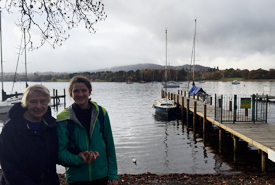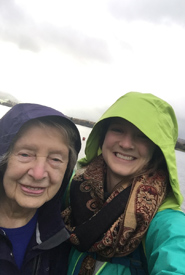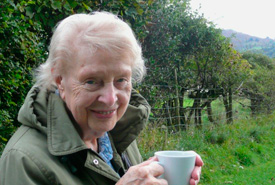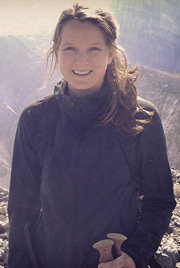What nature means to an 89-year-old

Author Zoë and her granny standing beside Lake Ambleside in England. (Photo by Zoë Arnold/NCC staff)
At six months shy of 90 years of age, my granny Vera is a strong-willed (some might say stubborn) English woman. Each time she boards the double-decker bus, she insists on climbing the narrow, winding stairs up to the top deck. As the bus begins to move, her long, delicate fingers clasp the railing, and she places each foot on the step in front of her before proceeding with the next. Upon reaching her decided destination for the day, it’s a careful trip back down the stairs, out the door and immediately to the nearest little brick bench, where she plops herself down and lets out a heavy sigh.
When asked why the top deck, she replies confidently, “Because the views are a million times better up top!”
The Lake District in northwest England offers some of the most spectacular views of rolling hills, glittering lakes, forests and picturesque countryside towns. Although I’ve never lived there for any extended period of time, I feel a sense of home every time I go back to visit my family. I can definitely understand my granny’s love for the lakes and her desire to enjoy the view, no matter how much of an effort it takes to do so!
The connection granny feels to the outdoors is strong, and one which runs deep in our family. Both she and my grandad grew up with a passion for the outdoors; it was what ultimately led them to each other, having met on a train while en route to a forestry camp in the southern Lake District.

Teaching granny the art of a nature selfie. (Photo by Zoë Arnold/NCC staff)
When my grandad Stan wasn’t flying planes as part of the Royal Air Force (RAF), he was observing birds in flight and passing this passion on to his eldest son, my father. When my grandad passed away, my granny decided to scatter his ashes at Leighton Moss, a nature sanctuary that provided some of his most treasured birding experiences.
While scattering his ashes, a RAF Hawk fighter jet on a training mission flew overhead. When my own father visited Leighton Moss at a later date, a robin flew down and landed next to him on the fence. Who’s to say the meaning of these encounters, their significance or the reasoning? I think that’s something that doesn’t need to be answered.
When I visited England this past November, I stayed with granny in her assisted-living facility in Kendal. There wasn’t a single day where we didn’t get outside. Some days it was a walk into town along the river, another day it was a bus ride to Ambleside and a walk onto Grasmere, and other days it was simply just to sit in the garden behind her home. The point of the matter being, no matter how slow we went or how far the distance, we got out.
We all know that spending time in nature is essential to a child growing up in a world of increasing technology. Author Richard Louv preaches it, doctors preach it and many of our schools preach it. However, I believe that it’s just as essential for the older generation to get out and immerse themselves in nature. Physically, your body benefits from the regular exercise and fresh air. Mentally, spending time in nature has been proven to decrease stress, decrease chances of depression and increase general mood. Finally, spending time outside encourages social interaction. My granny is at an age where loneliness is extremely prevalent in society, and these social interactions can be crucial.

Granny enjoying a coffee in Gransmere, Lake District, England. (Photo by Zoë Arnold/NCC staff)
Though she now lives in Kendal, on the southeast corner of Lake District National Park, granny makes the most of her free transit pass and regularly hops on that double-decker, making the journey deeper into her beloved Lake District. Even at 89 years old, she has never lost her connection to nature. Though she has slowed down, doesn’t always remember the order she did things in and has altered her activities over the years, she knows that she is lucky to still be able to explore in the way she does. Whether she’s venturing out for a walk alone, meeting friends for a coffee or just sitting by the lake, the fact that she is able to maintain her connection to nature is inspiring.
Maybe we could all learn a thing or two from those who are older and wiser. Just for a moment, let's imagine a world where everyone slowed down, was present in the moment and actually took time to “smell the roses.” Maybe, just maybe, we might get a little further as a whole.


